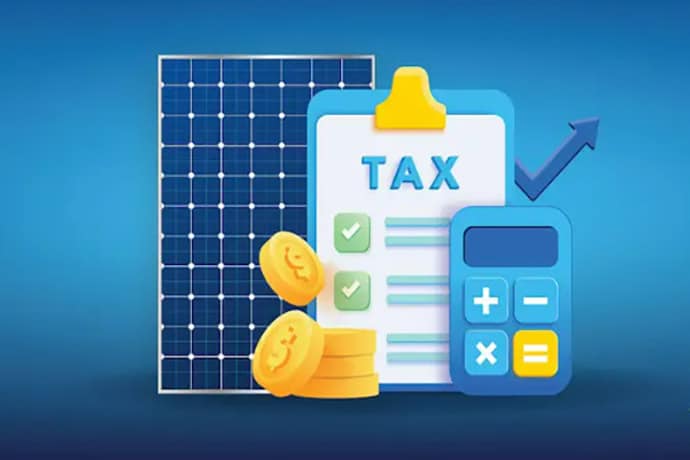Table of Contents
- What is the average cost of electricity in the United States?
- What is the average monthly electric bill with solar panels?
- Can solar panels really reduce your electric bill?
- How much can I save in a month with solar panels?
- Government Incentives Drive Transition to Clean, Green Solar
- Are solar panels worth it?
- Sungold BXF Series Portable Solar Panels
- In conclusion
Struggling with high electricity bills every month? Don’t worry! We have the solution. With solar panels, you will definitely notice a reduction in your average monthly electricity bill.
So read on to learn all about solar panels.
You’ll find the average electric bill in the United States, the average monthly electric bill with solar panels, some great Sungold solar solutions, and factors that affect solar efficiency.
Read to the end!
.jpg)
What is the average cost of electricity in the United States?
First let’s look at the statistics, the average electricity bill in the United States is estimated to be $141.41 in March 2024, according to the U.S. Energy Information Administration (EIA).
This number is based on two factors. First, the typical monthly energy usage in the U.S. (899 kWh). Second, the average price of electricity in December (15.73 cents per kWh).
Although this figure is, the average cost of electricity in the U.S. depends on several factors, such as household size, different states, and U.S. energy consumption habits.
1. Household Size
How large is your household? Do you own a single apartment, or does your entire family live in a large house? Of course, your average electric bill will vary depending on the size of your household.
If you live alone in a small apartment, you will use far fewer appliances than if you live in a large house with your family. In a large house with many people, you will inevitably use a lot of appliances.
2. Energy Consumption Habits
Now, let’s take a look at your energy consumption habits, which can also affect the average monthly electricity bill. For example, if you live alone and are away from home for most of the day due to work, you use fewer appliances.
On the other hand, if you work from home, you will obviously use more electricity for work, cooking, and other necessities. This will inevitably lead to a rise in your electricity bill.
3. States
In the United States, there are obviously different states, each experiencing different climatic and seasonal changes.
For example, Alabama is a warmer state. During the summer, more homes use air conditioners to stay cool in the heat. On the other hand, Alaska is a colder state. In the winter, more people will use heaters to stay warm in cold weather.
As a result, some states have higher electricity rates in certain months, while others have higher rates in other months.
Taking these aspects into consideration, here is a list of average electricity bills in some cities.
| State | Average Monthly Electricity Bill (USD) |
| Alabama | $147.75 |
| Alaska | $133.89 |
| Arizona | $131.35 |
| Arkansas | $123.69 |
| California | $123.67 |
What is the average monthly electric bill with solar panels?
Having considered all the factors that affect your average electric bill, let’s now consider your average monthly electric bill with solar panels.
Let’s assume you have a solar power system that generates an average of 965 kWh per month. Let’s also assume that the average cost of electricity in the United States is about $121, based on a monthly usage of 886 kWh. Therefore, you are now saving $121 per month.
However, if with the same solar system you use much more electricity (more than 965 kWh), you will still pay a portion of your bill, but most of the cost will be cut.
If the solar power is 965 kWh and the electricity bill is 12.96 kWh, you could save $125.06.
The table below shows the projected monthly savings with solar panels, depending on the average price per kilowatt-hour and average monthly electricity usage in certain states.
| State | Average Price per kWh (cents) | Average Monthly Usage (kWh) | Estimated Monthly Savings with Solar Panels (USD) |
| Alabama | 12.96 | 1,140 | $125.06 |
| Alaska | 22.55 | 594 | $133.89 |
| Arizona | 12.54 | 1,048 | $121.01 |
| Arkansas | 11.27 | 1,098 | $108.8 |
| California | 22.82 | 542 | $123.67 |
Can solar panels really reduce your electric bill?
The unquestionable fact is that if you have solar panels installed in your home, your average monthly electric bill will be significantly lower with solar panels installed compared to a home without solar panels.
After all, solar panels rely on the sun to produce clean energy. It greatly reduces your dependence on the power grid, which in turn reduces your dependence on the utility company. With solar panels, your average monthly electric bill will be significantly reduced.
However, another factor to keep in mind is that since solar panels rely on the sun, you will be relying on the grid for power at night and on cloudy days when the sun is not shining. As a result, you will be paying a monthly electricity bill.
How much can I save in a month with solar panels?
You can calculate your monthly solar savings amount by subtracting your solar system payment from your average electric bill. For example, if your average electric bill is $150 per month and your solar loan payment is $120 per month, your monthly savings would be $30 …… first.
However, it’s important to note that while your solar payment stays the same for the life of your loan, your electric bill will continue to rise as rates increase. So that initial $30 per month will eventually become $50 per month, $75 per month, and eventually more than $100 per month.
As the cost of electricity continues to rise, your solar savings will increase over time.
Government Incentives Drive Transition to Clean, Green Solar
Of course, there are other factors that can affect the savings when installing solar energy, such as the very attractive government incentives that are now being offered.
The U.S. government has created an incentive program to help people install solar energy systems because people know it’s critical to make this clean energy transition – the sooner the better.
Homeowners will need to check out other state and local incentive programs, but the generous federal solar tax credit program that will be offered through 2032 will credit 30% of the cost of the system, including installation.
The 30% of the cost is a 1:1 deduction on the amount of federal income tax you would have paid in the year the system was installed. (The tax credit also allows the credit to be carried over to the next year if desired.)
In addition, there is no limit to the amount of the program, so if you install a larger, more extensive, and more expensive system, the 30% cost tax credit deducted from your federal income tax due will be higher.
The federal solar tax credit includes the following eligible costs:
- Solar photovoltaic (PV) rooftop solar panel arrays
- Balance-of-system equipment, including wiring, inverters, and mounting equipment
- Energy storage equipment with a capacity of 3 kilowatt-hours (kWh) or greater. (If the energy storage equipment is installed in the tax year following the tax year in which the solar panel system is installed, it is still eligible, subject to the installation date requirement.)
- Contractor’s labor costs, including site preparation, assembly, and original installation, including permit fees, inspection fees, and any developer fees
- Sales tax on the above eligible costs
Are solar panels worth it?
The big question is: While your average monthly electricity bill is reduced with solar panels, are solar panels really worth it? This question sounds simple, but the answer is not so easy. There are a few things you need to keep in mind when choosing to invest in solar panels.
While the average monthly electricity bill is significantly lower with solar panels, their initial investment is still high.
- Can you afford to pay for it?
- Where do you live? Is the sunlight exposure enough for the solar panels to work?
- How long do you stay in your home? That is, do you have enough power needs to warrant the use of solar panels?
Your answers to these questions will determine whether solar panels are worth your while. If you have the money to invest, get enough sunlight exposure, and stay at home most of the time, then solar panels are worth it for you.
Now, talking about solar panels, let’s take a look at some of the amazing Sungold solar panels that you can consider buying.
Sungold BXF Series Portable Solar Panels
Powerful Design
Reinforced 4-in-1 buckle design, Sungold conducted 10,000 times tensile testing, more stable, durable, scratch-resistant, support strong pull will not break.
Built-in charging port at the carrying handle, which simplifies the operation process while highlighting the simple appearance.
Multi Interface
The folding solar panel has a built-in charging port in the power box | 200W does not have a junction box, but does have charging wiring.
The solar panel can charge your smartphones, tablets, laptops, and portable power stations. (It doesn’t store any electricity because there are no batteries inside.)
| Wattage | 20W | 30W | 60W | 120W | 200W | 200W |
| Charging Ports | USB | USB; Type-C | USB; Type-C; DC5521 | USB; Type-C; DC5521 | MC4 | MC4 |
12 Month Warranty
Sungold solar panels will come with a 12 month warranty and 7*24 customer service after your purchase. Customers can contact Sungold professionals at any time if they have any questions about the product.
Complete kit, ready to use out of the box
This is a solar charger for all 12V batteries with an optimal voltage of 18V.Provides protection against: overcharging, overloading, short circuits.
In conclusion
Installing solar panels can significantly reduce the average monthly electric bill for U.S. homeowners. Specifically also learn about this homeowner’s guide to going solar.
While the exact savings vary depending on factors such as location, energy consumption, and system size, many solar users see their electricity costs drop substantially.
In some cases, solar energy can even eliminate the monthly electric bill altogether.
As more households turn to renewable energy solutions, the financial and environmental benefits of solar power continue to make it an appealing choice for sustainable living.








